Key Takeaways: DuckDuckGo Alternatives
- We selected the alternatives to DuckDuckGo in this list based on how well they refrain from tracking users and the unique features they have.
- Our favorite alternatives to DuckDuckGo include Brave Search, Qwant, Swisscows, Mojeek and YaCy.
- Two other options worth mentioning are Startpage and Gibiru.
Known for its refusal to track its users, DuckDuckGo is one of the best privacy-focused search engines. It doesn’t track or store your search history, IP address or other personal information, and it has several unique features. Understandably, it can’t be for everyone. If you’re looking for a DuckDuckGo alternative, read our guide to learn about some of the best options.
One of DuckDuckGo’s flaws is its over-reliance on third-party search engines for its search results. Although it has its own web index, DuckDuckGo generates its search results from over 400 sources, including Bing, Yahoo! Search BOSS, Wolfram Alpha and Yandex. Most of the options listed in this article rely mainly on their own web index or enable users to create their own indexes.
If you want to learn more about DuckDuckGo and how it works, read our guide on what is DuckDuckGo. For some of the best statistics and facts about search engines, read our search engine statistics guide.
-
09/07/2023 Facts checked
Rewritten to include current information about DuckDuckGo alternatives and updated with new images.
The Cost of Privacy
Google and other traditional search engines collect huge amounts of user data when people use them to search the web. Like most internet companies, they claim to use this data solely for improving the quality of service and providing personalized search results, which most users find helpful. However, this can lead to several repercussions for users.
For example, Microsoft, which owns Bing, was accused of sharing its customer data with Facebook and other third parties in 2020. Unfortunately, sharing user data with third-party services is not the only concern privacy experts have about search engines that track users. There is also a greater risk of data breaches, government surveillance and identity theft.
DuckDuckGo and other private search engines eliminate these risks by not tracking users’ search history, IP address and other information that could be used to personally identify them.
When traditional search engines like Google and Yahoo were the only options, it was hard to imagine a world where search engines could provide a high-quality search experience without tracking users’ search history.
The emergence of private search engines has put an end to this doubt. However, they still have catching up to do in terms of returning relevant search results. Still, many private search engines have come up with unique ways to provide a rich and personalized search experience without tracking users.
DuckDuckGo and some other private search engines don’t offer personalization because they put a higher emphasis on privacy. This is sufficient for some users, but there are options that aim to provide the best of both worlds. Our list includes some of these all-rounders.
What Makes the Best DuckDuckGo Alternative?
All the DuckDuckGo alternative search engines we’re recommending take stringent measures to protect user privacy. Our top suggestions include:
- Brave Search — Lets users choose their search algorithms.
- Qwant — France-based search engine with a child-friendly version.
- Mojeek — Private search engine that relies on its own web crawler.
- Swisscows — Family-friendly private search engine located in Switzerland, which has some of the world’s best privacy laws.
- YaCy — Censorship-resistant search engine that operates based on a peer-to-peer architecture.
Most mainstream search engines have earned a bad reputation for collecting data that can be used to personally identify users. Google is notorious for collecting your name, email address and contact details when you use services like Google Chrome, Gmail and Google Workspace. It uses this information to serve you personalized search results.
Private search engines like DuckDuckGo distinguish themselves by not tracking unique identifiers, including your IP address and search history. This means the best alternative search engines to DuckDuckGo are other search engines that don’t track users.
In addition to not tracking users, the best DuckDuckGo alternatives have rare standout features or benefits. One of DuckDuckGo’s unique features is “bangs” — short commands you can type into the DuckDuckGo search bar if you plan to visit a particular web page. Our list includes private search engines that come with similarly useful features.
The 5 Best DuckDuckGo Alternatives
Below are our favorite alternative search engines to DuckDuckGo, starting with Brave Search.
1. Brave Search
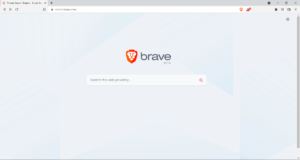
Pros:
- Remove ads for a fee
- User rated search rankings
- Independent web index
Cons:
- Uses the indexes of other search engines
Launched as the default search engine for the Brave browser in 2021, Brave Search has fast become a popular search engine. It does not track users and has an independent web index, which it uses to serve 92% of its search results. For the rest, it relies on Google and Bing. To prevent and minimize tracking, Brave Search retrieves Bing results via the server side and Google results via the client side (or on an opt-in basis).
In a bid to enhance user privacy, Brave Search gives users the option to remove ads for $3 per month on the premium version. Its ads do not rely on trackers or records of your online activity. However, even non-targeted ads can be annoying, so we appreciate this feature.
To learn about some of the best options for blocking ads on other search engines, read our best ad blocker guide.
Be in Control of Search Rankings
Another way Brave Search distinguishes itself as an alternative search engine is in the way it determines which results rank highly. Most search engines use their own algorithms to determine website rankings, which sometimes results in biased rankings and low-quality search results.
Brave Search doesn’t have its own hidden algorithms, but it gives users control over what ranks using an open-source tool called Goggles. Currently in beta, Goggles lets Brave users choose their ranking algorithms for search results. Goggles can rerank results to boost content according to political affiliation, specific industries or content length. Additionally, you can create your own ranking category.
2. Qwant

by not tracking or analyzing your personal data.
Pros:
- Has its own web index
- Offers Qwant Junior for kids
- User-friendly interface
Cons:
- Uses Bing’s search algorithm
Qwant is a French search engine that has a lot of similarities to Google. It’s also the default search engine for the French government, which adopted it amid privacy concerns about Google. Qwant does not log user data and makes privacy its central focus.
Qwant has its own web index but supplements it with results from Bing. Like Google, Qwant allows you to filter search results according to categories, such as news, images, videos, shopping and maps. Qwant has also expanded and created search engines with specific users in mind, such as Qwant Junior and Qwant Maps.
Qwant Junior and Qwant Maps

Qwant Junior is Qwant’s child-friendly version, designed for children ages six to 12. Qwant Junior doesn’t show advertisements or adult content. It also offers educational content thanks to a partnership with the BayaM app.
Qwant Maps is a private web-based mapping service that includes a range of features to help users navigate their environment. This includes maps for virtually every part of the world, directions between different locations and local business information.
However, Qwant Maps is not as developed as Google Maps. For example, it doesn’t bring out many results for nearby places to visit and its business information lacks details like reviews, about and photos.
3. Mojeek
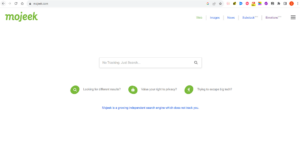
Pros:
- In-house web index
- Emoticons web search
Cons:
- Small web index
Mojeek launched as the first private search engine in 2006. It doesn’t store your search history or IP address, and it doesn’t set cookies on the websites you visit, so it can’t monitor your activity on these websites. In cases where a website requires it to set cookies, Mojeek asks you to confirm your agreement. You can instruct Mojeek to delete these cookies at any time.
To anonymize users’ IP addresses, Mojeek replaces each IP address with a two-letter code that represents the user’s country of origin. Mojeek also has its own index of web pages that doesn’t rely on the indexes of other search engines. Unfortunately, the index is small.
Environment-Conscious Search Engine Company
Mojeek’s web index requires it to maintain hundreds of servers. To reduce its carbon footprint, Mojeek built its servers in Custodian Data Center, a U.K.-based energy-efficient data center that won the Green Data Centre award for its fresh air cooling system. Mojeek is backed by a group of private investors, who it claims are dedicated to building eco-friendly businesses.
4. Swisscows (formerly Hulbee)

Pros:
- Family-friendly search
- Located in Switzerland
- Provides helpful suggestions
Cons:
- Uses Bing’s web index
Swisscows is a great private search engine for users who are particular about protecting younger members of their family from explicit content. It is family-friendly by default, omitting explicit search results. It also has a feature called “semantic map,” a group of related search terms that appear on every search result page and provide helpful search suggestions.
Swisscows does not collect cookies, IP addresses or search queries, keeping the search experience as privacy-friendly as possible. It has its own web index but also uses Bing’s web index.
Located in Privacy-Friendly Switzerland
As a bonus to its non-tracking qualities, Swisscows is located in Switzerland, which is home to some of the best privacy laws in the world. This includes Article 13 of the Swiss Constitution, the Federal Act on Data Protection and the General Data Protection Regulation (GDPR).
These laws force internet services to seek consent from their users before they store or process their personal data. This means Swisscows wouldn’t be able to use your data without your permission even if it did begin tracking its users.
5. YaCy
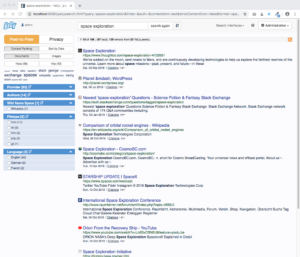
thousands of independent web crawlers.
Pros:
- No centralized control
- Broad range of content
- Uncensored private search
Cons:
- Requires some technical knowledge
YaCy is quite different from every other private search engine on this list. It is a distributed open-source search engine that operates on an underlying peer-to-peer (P2P) network. No single person or group is in charge of its software. Instead, the software is distributed among hundreds of interconnected private computers run by members of the YaCy network.
Each YaCy peer crawls the internet to find and index web pages, which become available to other peers in the network. Typical privacy concerns are non-existent in the YaCy network since no single entity is in charge of user data. YaCy’s open-source software is not subject to any nation’s censorship laws (read our internet censorship guide to learn how censorship works around the world).
Access to a Diverse Range of Content
YaCy provides a diverse range of content, made possible by thousands of independent web crawlers. It can even provide rare content that is difficult to find on centralized search engines. However, the quality of the search results is adjustable and depends on how you use it. For example, you can specify the sites you want to crawl and you can add your preferred sites to the network pool.
Honorable Mentions
While there are many private search engines, our list focuses on those that do an excellent job of preserving user privacy. We had to limit the ranking to five entries for the sake of brevity, but there are two more worth mentioning.
1. Startpage
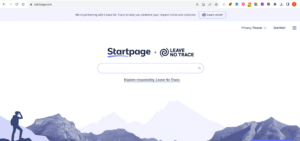
Startpage obtains its search results from Google Search, but still maintains privacy by not tracking users or storing personal information or search history. As a result of using Google’s web index, Startpage provides high-quality search results. One of its distinguishing features is its “anonymous view,” which masks your identity via a proxy while you visit websites that appear in its results.
Startpage didn’t make the main list because of how it handled its 2019 merger with Privacy One Group, which is a subsidiary of System1, a U.S. advertising company known for profiling users for targeted ads. After the partial acquisition, Starpage received backlash from users who wanted to know how it would continue to preserve privacy while doing business with an advertising company.
Startpage failed to respond transparently to the queries until it was delisted from the popular website Privacy Tools. It later updated its privacy policy to clarify that it doesn’t make user data accessible to Privacy One Group. Understandably, the merger might still be concerning to some users.
2. Gibiru
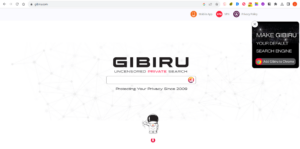
content from major search engines, such as Google.
Gibiru bills itself as an “uncensored private search engine.” Not only does it preserve user privacy by not storing personal information, but it also provides access to content censored by major search engines like Google. Gibiru uses the Google search algorithm to generate search results but doesn’t censor them.
Gibiru also stands out for using AES-256 encryption, which makes user data inaccessible to any entity that does not have the encryption key for decrypting it.
That said, it didn’t make the main list because of its relatively small web index. The search engine generated an average of five pages of results for most queries.
Why You Should Use a Private Search Engine
Most mainstream search engines personalize ads and search results through the data they gather from users. This makes it easy for users to find answers, products and services tailored to their preferences. Unfortunately, this is often achieved through information gleaned from sensitive user data, such as medical history, financial records, political leanings and more.
All the data compiled can potentially be leaked, hacked or shared with intelligence agencies. Luckily, private search engines offer a better alternative. They guarantee privacy by not keeping records of your search history, your IP address or any other information that could be used to identify you.
If privacy matters to you (and 2023’s data privacy statistics suggest that it should), consider using a private search engine.
Final Thoughts: Best DuckDuckGo Alternative
Independent web indexes, no-tracking policies and good private practices sum up the factors to consider when choosing a private search engine. DuckDuckGo and the services we’ve listed as great alternatives to it meet these requirements.
If you’re considering ditching DuckDuckGo for another service due to usability issues, consider reading our how to use DuckDuckGo guide.
Have you ever used any of the options we listed? Do you have other recommendations? What’s your best DuckDuckGo alternative? Let us know in the comment section below, and as always, thanks for reading.
FAQ: Private Search Engines Like DuckDuckGo
-
Some of the best search engines that provide unbiased search results are DuckDuckGo, Brave Search, Qwant, YaCy and Mojeek.
-
No, DuckDuckGo is an independent search engine company.
-
Some of the best alternatives to DuckDuckGo include Brave Search, Qwant, Swisscows and Mojeek.
-
Yes, DuckDuckGo, Brave Search, Qwant and Mojeek are some of the best private search engines.
The post Best DuckDuckGo Alternative: Private Search Engines in 2023 appeared first on Cloudwards.

